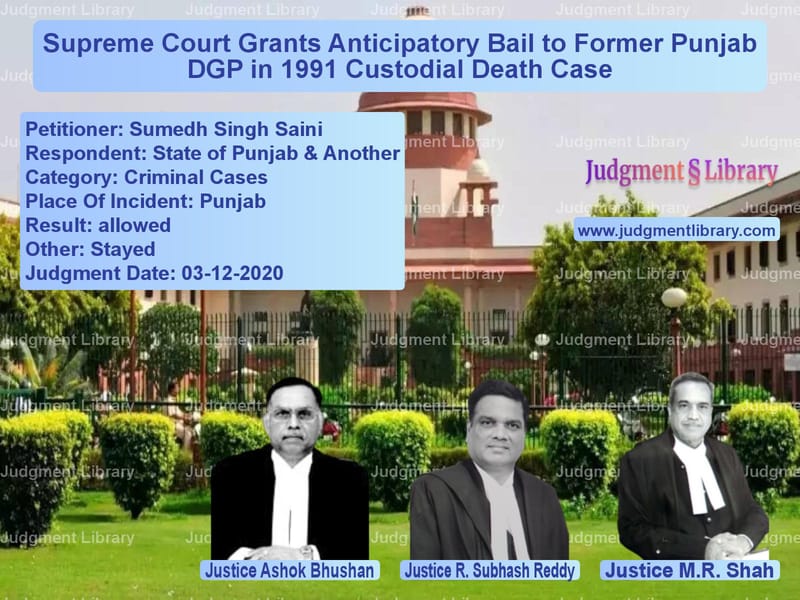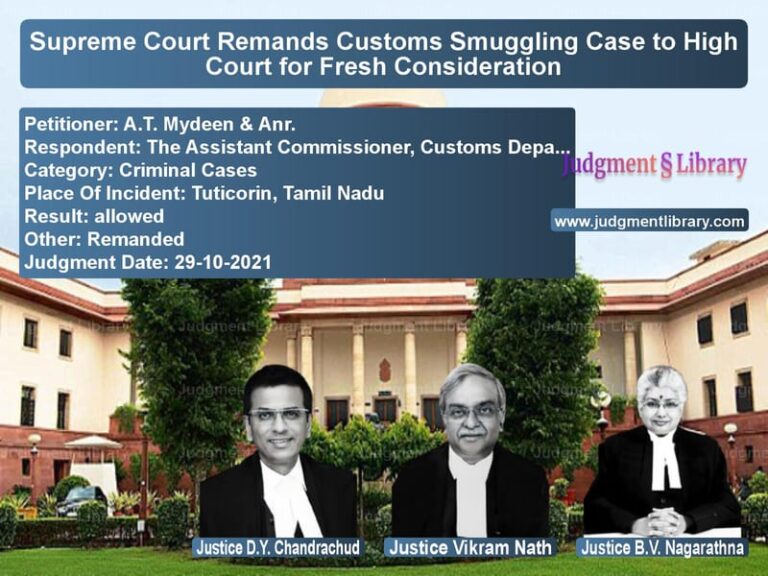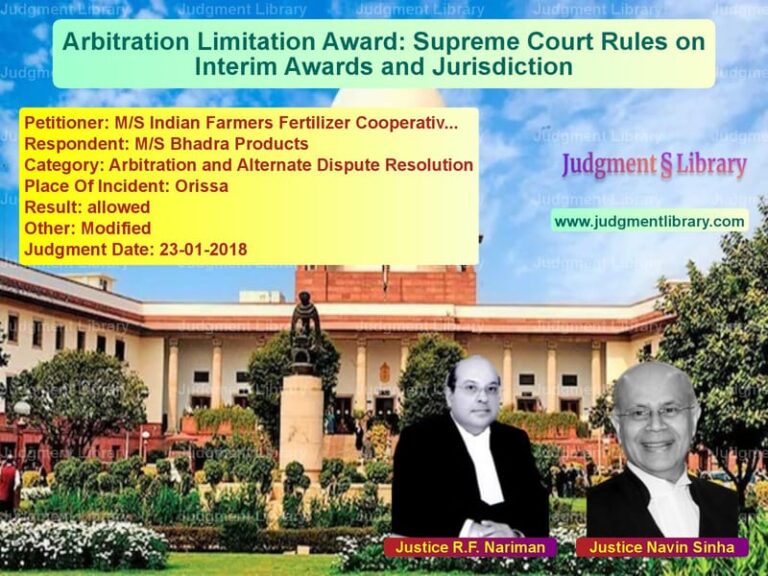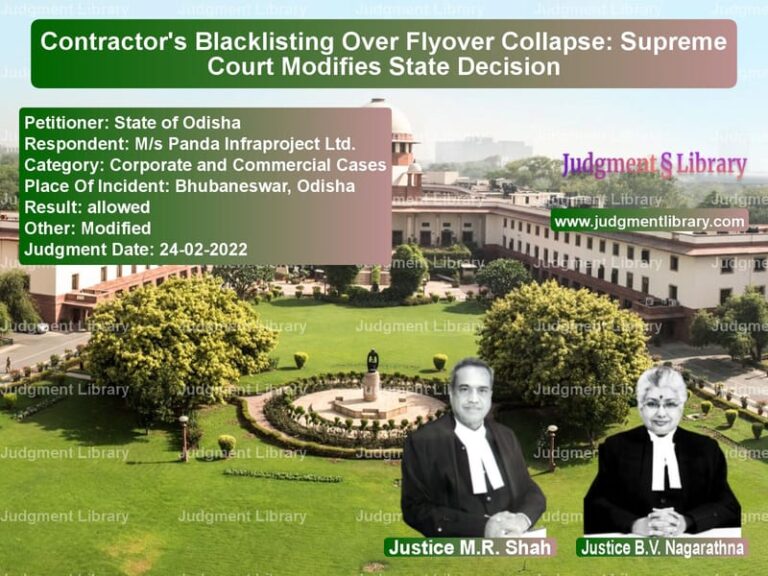Supreme Court Grants Anticipatory Bail to Former Punjab DGP in 1991 Custodial Death Case
The Supreme Court of India, in its judgment in Sumedh Singh Saini vs. State of Punjab & Another, addressed the legal complexities surrounding a custodial death case dating back to 1991. The case involved serious allegations of abduction, torture, and extrajudicial killing of Balwant Singh Multani, for which the appellant, Sumedh Singh Saini, a former Director General of Police (DGP) in Punjab, was accused. The central issue before the Court was whether Saini should be granted anticipatory bail in light of the significant delay in filing the FIR and the political motivations alleged by the defense.
Background of the Case
- In 1991, Balwant Singh Multani was allegedly abducted by Punjab Police officials under the instructions of then SSP Sumedh Singh Saini.
- The victim was reportedly subjected to custodial torture and subsequently disappeared, with no official records of his release.
- The case resurfaced in 2020 when the victim’s brother lodged an FIR against Saini and other officers.
- The Punjab government added Section 302 (murder) to the FIR after obtaining statements from co-accused who later turned approvers.
- Saini, fearing arrest, sought anticipatory bail from the Punjab and Haryana High Court, which was denied, prompting an appeal before the Supreme Court.
Petitioner’s Arguments
Sumedh Singh Saini, through his counsel, argued:
- The FIR was politically motivated and aimed at harassing him decades after the incident.
- The allegations were previously examined in another case and dismissed by the Supreme Court.
- The delay of 29 years in filing the FIR was unjustified and indicated malafide intent.
- The witnesses who turned approvers did so under coercion.
- The Punjab government added Section 302 IPC arbitrarily despite no new evidence.
- His custodial interrogation was unnecessary as he had cooperated with the investigation.
Respondent’s Arguments
The State of Punjab opposed the anticipatory bail, arguing:
- The case involved a grave violation of human rights and demanded a thorough investigation.
- The delay in filing the FIR was justified as the victim’s family was previously intimidated from taking legal action.
- The statements from co-accused who turned approvers provided fresh material evidence.
- Saini, being an influential person, could tamper with evidence or influence witnesses if granted bail.
- The custodial interrogation of the accused was crucial to uncover the details of the crime.
Supreme Court’s Observations
The Supreme Court, in its judgment delivered by Justices Ashok Bhushan, R. Subhash Reddy, and M.R. Shah, made several key observations:
1. Delay in Filing FIR
The Court acknowledged the 29-year delay in filing the FIR but emphasized that in custodial death cases, delay alone cannot be a ground for quashing proceedings.
“While delay in lodging FIRs may sometimes raise doubts on credibility, custodial deaths present unique challenges where victims’ families may hesitate to come forward due to fear or intimidation.”
2. Political Vendetta Allegations
The Court observed that allegations of political motivations were unsubstantiated and irrelevant in considering the grant of anticipatory bail.
“A serious offense cannot be disregarded merely on the assumption of political vendetta.”
3. Impact of Previous Cases
The Court noted that Saini’s involvement had been reviewed in past cases but ruled that the present FIR, based on new witness statements, warranted investigation.
4. Necessity of Custodial Interrogation
The Court examined whether custodial interrogation was necessary, ruling:
“Given the prolonged delay and the emergence of new statements, custodial interrogation of the accused is not immediately warranted, provided he cooperates with the investigation.”
Final Judgment
- The Supreme Court set aside the High Court’s ruling.
- Saini was granted anticipatory bail, subject to conditions.
- He was required to furnish a personal bond of Rs. 1,00,000 with two sureties.
- He was directed to cooperate with the investigation and surrender his passport.
- The Court reserved the right to cancel the bail if evidence of non-cooperation emerged.
Implications of the Judgment
This ruling has significant implications:
- Sets a precedent for granting anticipatory bail in custodial death cases with significant delays.
- Reinforces that allegations of political vendetta do not automatically nullify criminal proceedings.
- Clarifies the necessity of custodial interrogation in cases involving delayed FIRs.
- Establishes conditions for anticipatory bail in high-profile human rights violation cases.
The Supreme Court’s judgment provides a balanced approach, ensuring the accused’s right to liberty while allowing the investigation to proceed fairly.
Petitioner Name: Sumedh Singh Saini.Respondent Name: State of Punjab & Another.Judgment By: Justice Ashok Bhushan, Justice R. Subhash Reddy, Justice M.R. Shah.Place Of Incident: Punjab.Judgment Date: 03-12-2020.
Don’t miss out on the full details! Download the complete judgment in PDF format below and gain valuable insights instantly!
Download Judgment: Sumedh Singh Saini vs State of Punjab & An Supreme Court of India Judgment Dated 03-12-2020.pdf
Direct Downlaod Judgment: Direct downlaod this Judgment
See all petitions in Custodial Deaths and Police Misconduct
See all petitions in Bail and Anticipatory Bail
See all petitions in Judgment by Ashok Bhushan
See all petitions in Judgment by R. Subhash Reddy
See all petitions in Judgment by Mukeshkumar Rasikbhai Shah
See all petitions in allowed
See all petitions in Stayed
See all petitions in supreme court of India judgments December 2020
See all petitions in 2020 judgments
See all posts in Criminal Cases Category
See all allowed petitions in Criminal Cases Category
See all Dismissed petitions in Criminal Cases Category
See all partially allowed petitions in Criminal Cases Category







